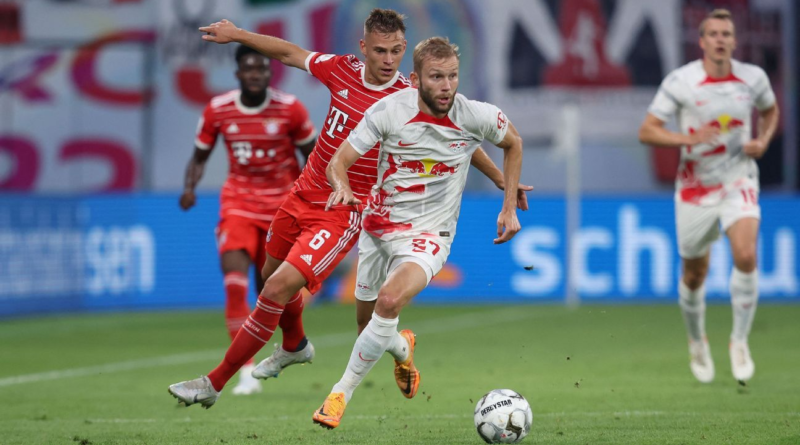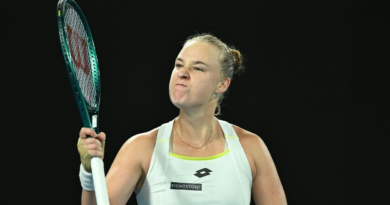Leipzig have overtaken Dortmund as Bayern's No. 1 talent provider
Editor’s note: ESPN’s lead Bundesliga commentator, Derek Rae, is in Leipzig this week for Friday’s return of Germany‘s top flight and examines the possibility that the club most hard-core fans have little time for might nevertheless represent Bayern’s closest pursuers over the long haul.
January in Eastern Germany can be a grim time with bleak, cold weather, serving as a reminder of why the Bundesliga has historically favoured a lengthy winter break extending from before Christmas and well into the new calendar year. Despite the bitter Sachsen chill and a forecast hinting at a liberal helping of snow showers, there is optimism among those who have latched on to the newest of new clubs in the East, that RB Leipzig can, at a minimum, finish second in the Oberhaus as they’ve done twice before in their brief, polarizing history.
That they are not to everyone’s taste is important for those who don’t closely follow German football to know. A few years ago, a UK-based colleague asked me about RBL and suggested that their rapid rise up the divisions must be viewed as a wonderfully romantic story. Maybe if they were an English club, that might be true — not many in the German fan scene see it as remotely wonderful or romantic.
Red Bull looked long and hard before settling on Leipzig as a suitable city to wield their influence, essentially taking over the then-fifth-tier-side SSV Markranstadt and rebranding them. The “RB” in “RB Leipzig,” it should be pointed out, stands for Rasenballsport — “lawn ball sport.” In Germany, new clubs may not take on the name of a sponsor or company and are restricted in terms of what a sports club can be called, so someone cleverly thought of RasenBallsport or RB. It’s still remarkable how many in the Anglo world actually think they are formally called “Red Bull Leipzig,” which was the whole point of the exercise. Leipzig’s marketing department likes the nickname “die Roten Bullen” (the Red Bulls) and conveniently ignores their RasenBallsport branding.
– Stream on ESPN+: LaLiga, Bundesliga, more (U.S.)
– Leipzig vs. Bayern: Friday, 2:30 p.m. ET, stream live on ESPN+ and ESPN2
Their initial interpretation of the 50+1 rule — which stipulates that fans must have majority control of a club — with very few members, and all associated with the energy drinks enterprise, allowed them to act in a manner out of kilter with club norms in Germany. By 2016, RB Leipzig, under the astute stewardship of Ralf Rangnick on the football side, had ascended all the way to the top flight.
In the years since, as they’ve entrenched in the top half of the Bundesliga table, notable figures in the German game have sung their praises. Former Bayern Munich CEO Karl-Heinz Rummenigge has said he sees them as “eine Bereicherung” (“an enrichment”) for the league.
RB Leipzig’s sporting setup in Cottaweg is the envy of most other clubs, and their financial backing certainly helps, but Rangnick was a man with a plan that worked. The idea was to sign top young players, polish them, get them playing the RBL Gegenpressing (“counter-pressing”) way and then eventually moving them on for a profitable transfer fee. It’s a technique they have repeated over many years.
They are assisted by having partner clubs also under the RB name, especially FC Salzburg in Austria.
German football at its core is an expression of wider community, and the suspicion remains that RB Leipzig have yet to properly build this, preferring to jump the queue through structural advantages while riding roughshod over what makes football sing in a country boasting the highest average attendances in Europe.
The intense dislike of RBL is not going away, either. Fans of rank-and-file clubs have been heard to say that they would prefer to see Rekordmeister Bayern win the title for an 11th year running than have to bear the sight of RB Leipzig breaking the cycle.
Once upon a time, Borussia Dortmund were accused of not doing enough to prevent their top players from moving directly to Bayern. The truth in 2023 is that anyone who believes it’s still happening should look at a different direction of travel: from Leipzig to Munich.
This actually all started with Joshua Kimmich in 2015, but has intensified in recent years. No sooner had Dayot Upamecano agreed to tie his future to Bayern in 2021, than Julian Nagelsmann — who made Leipzig more of a rounded team in possession — was the man Rummenigge & Co. wanted as their head coach. His presence then helped secure the signing of another Leipzig stalwart in Marcel Sabitzer. Now it looks like only a matter of time before Bayern confirm the acquisition of Sabitzer’s fellow Austria midfielder Konrad Laimer as of the summer.
They say imitation is the sincerest form of flattery, but there’s no need to imitate when you have the wherewithal to go and get exactly what you want from a main rival. The fact is that Bayern — with their track record of success — remain a dream for most German-based footballers.
So how do RBL keep pace with this fact? That’s the task facing Max Eberl, the longtime Borussia Monchengladbach sporting chief, who’s back in the game at Leipzig after taking almost a year out.
For a start, Leipzig have an excellent track record when it comes to succession planning. Losing Naby Keita, Ibrahima Konate and Upamecano hasn’t damaged RBL too much. It’s a plus when you’re able to stay ahead of those expected exits, identifying and signing the likes of Josko Gvardiol, Mohamed Simakan and Dani Olmo. Eberl’s contacts and eye for a player should only elevate this conveyor-belt aspect at the club, even if — as is likely — Bayern continue to come calling for the best of the rest in the Bundesliga.
RBL have been Champions League and Europa League semifinalists, and last May, bagged their first major trophy by overcoming the people’s choice, SC Freiburg, in the DFB-Pokal final.
They’ve gone from Gegenpressing to possession with Nagelsmann, to more Gegenpressing under Jesse Marsch, and then back to ball control with Domenico Tedesco. Now, coach Marco Rose has come up with an effective hybrid formula. To use an English-sounding expression now common in German, “the trend is your friend.” After pulling back a 3-0 deficit to draw at FC Augsburg in late October, Leipzig adroitly reeled off four successive wins against Bayer Leverkusen, TSG Hoffenheim, Freiburg and Werder Bremen, while their Champions League form showed a similar run of consecutive victories.
Against Bayern on Friday (2:30 p.m. ET, stream live on ESPN+ and ESPN2) however, Leipzig know they must swim against the tide of history having only ever defeated Germany’s foremost club once, in March 2018. Repeating that feat without the injured Christopher Nkunku won’t be easy, but there’s enough quality within Rose’s team for them to strike a blow for the chasing pack as a whole, especially against a Bayern team shorn for the next few months of Manuel Neuer.
RB Leipzig will remain largely unloved by the otherwise committed. Admire them or loathe them, though, they’re not going to be exiting the stage any time soon.




